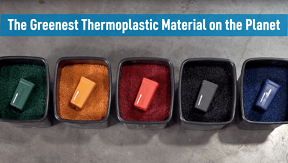UBQ Materials is an Israeli company that produces a thermoplastic compound from household waste. Their first factory outside Israel is under construction in Bergen op Zoom (the Netherlands). It will process over 100,000 tons of municipal waste to 80,000 tons of plastic material. The installation will become operational by the end of 2023.

Organic fraction
The process of UBQ Materials uses the organic fraction of household waste: food leftovers and mixed plastics, and also cardboard, paper and even dirty diapers. It will process this fraction to an alternative for plastic. The final product consists of UBQ pellets, a resource for many products. Although its original resource is a heterogeneous waste stream, the composition of these pellets is fairly constant. The equipment breaks down the organic material to lignin, cellulose, fibres and sugars; and then reassembles these into a matrix. Plastic present in the waste stream will melt and be absorbed in the matrix – forming a new kind of plastic. This is how UBQ succeeds in making a homogeneous product. How all this takes place in actual practice – that is a well-kept industrial secret.
The first step is that UBQ Materials removes from the waste stream anything that can be recycled, like metals and minerals. ‘That is not a technology imperative,’ says Rachel Barr, vice-president sustainability at UBQ Materials, ‘but in not doing so, we would break our own sustainability principles. Whatever remains, becomes UBQ.’ The quote is from an article on change.inc. The end product has many possible applications. It can be used for plastic dog kennels and household products. The company secured demand for its product from some major companies, like Mercedes, McDonald’s, PepsiCo, AB Indev and various chemical companies.
UBQ: recycled materials
On its site, UBQ Materials says the following about their product:
– UBQ consists of 100% recycled materials, and can be recycled itself;
– on balance, it prevents climate gas releases, because waste is no longer incinerated or landfilled;
– the new material is homogeneous and consistent;
– it is priced competitively;
– it gives a new existence to waste, and in doing so it prevents the use of resources like wood, fossil fuels, minerals and concrete;
– the material contains at least 50% biobased content.
UBQ is a thermoplastic compound, says Barr. It is an excellent substitute for materials in the automotive industry and in furniture. It could also substitute Pvc in Pvc tubes. But it is not allowed as a food packaging. That is being protected by strict rules, and for the time being the material does not comply to them.
Interesting? Then also read:
Plastic recycling: urgent, but a major problem
Chemical recycling of mixed plastic waste
The role of chemistry in the reduction of plastic waste
